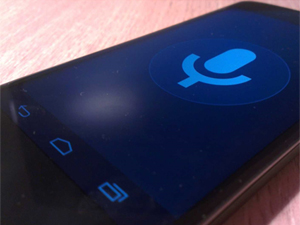



Date:16/02/17
 MIT has developed a chip that could vastly expand the use of speech recognition in electronics. The low-power chip is specialised for automatic speech recognition with MIT researchers claiming it requires between 0.2 and 10 milliwatts compared to the 1 watt that a mobile phone running speech-recognition software might devour.
MIT has developed a chip that could vastly expand the use of speech recognition in electronics. The low-power chip is specialised for automatic speech recognition with MIT researchers claiming it requires between 0.2 and 10 milliwatts compared to the 1 watt that a mobile phone running speech-recognition software might devour.
The claimed power savings vary between 90% and 99%, which would allow voice control to be harnessed by simple electronic devices and could have huge impact on its use in the IoT.
Part of the energy savings are delivered by a “voice activity detection” circuit that monitors ambient noise and kicks a more complex system into play if it detects speech.
While the chip does have to retrieve data, which is energy intensive, researchers have worked to minimise the amount of data it has to gather.
In a statement on the MIT website, Anantha Chandrakasan, the Vannevar Bush Professor of Electrical Engineering and Computer Science at MIT, whose group developed the new chip, said: "Speech input will become a natural interface for many wearable applications and intelligent devices.
“The miniaturisation of these devices will require a different interface than touch or keyboard. It will be critical to embed the speech functionality locally to save system energy consumption compared to performing this operation in the cloud."
Michael Price, who led the design of the chip as an MIT graduate student in electrical engineering and computer science and now works for chipmaker Analog Devices presented a paper on the findings at the International Solid-State Circuits Conference.
The paper was written by Chandrakasan, Price and Jim Glass, a senior research scientist at MIT’s Computer Science and Artificial Intelligence Laboratory.
The research was funded through the Qmulus Project, a joint venture between MIT and Quanta Computer, and the chip was prototyped through the Taiwan Semiconductor Manufacturing Company’s University Shuttle Program.
New chip could rapidly expand use of voice control
 MIT has developed a chip that could vastly expand the use of speech recognition in electronics. The low-power chip is specialised for automatic speech recognition with MIT researchers claiming it requires between 0.2 and 10 milliwatts compared to the 1 watt that a mobile phone running speech-recognition software might devour.
MIT has developed a chip that could vastly expand the use of speech recognition in electronics. The low-power chip is specialised for automatic speech recognition with MIT researchers claiming it requires between 0.2 and 10 milliwatts compared to the 1 watt that a mobile phone running speech-recognition software might devour.The claimed power savings vary between 90% and 99%, which would allow voice control to be harnessed by simple electronic devices and could have huge impact on its use in the IoT.
Part of the energy savings are delivered by a “voice activity detection” circuit that monitors ambient noise and kicks a more complex system into play if it detects speech.
While the chip does have to retrieve data, which is energy intensive, researchers have worked to minimise the amount of data it has to gather.
In a statement on the MIT website, Anantha Chandrakasan, the Vannevar Bush Professor of Electrical Engineering and Computer Science at MIT, whose group developed the new chip, said: "Speech input will become a natural interface for many wearable applications and intelligent devices.
“The miniaturisation of these devices will require a different interface than touch or keyboard. It will be critical to embed the speech functionality locally to save system energy consumption compared to performing this operation in the cloud."
Michael Price, who led the design of the chip as an MIT graduate student in electrical engineering and computer science and now works for chipmaker Analog Devices presented a paper on the findings at the International Solid-State Circuits Conference.
The paper was written by Chandrakasan, Price and Jim Glass, a senior research scientist at MIT’s Computer Science and Artificial Intelligence Laboratory.
The research was funded through the Qmulus Project, a joint venture between MIT and Quanta Computer, and the chip was prototyped through the Taiwan Semiconductor Manufacturing Company’s University Shuttle Program.
Views: 399
©ictnews.az. All rights reserved.Similar news
- Azerbaijani project to monitor disease via mobile phones
- Innovative educational system to be improved under presidential decree
- NTRC prolongs license of two TV and radio organizations for 6 years
- Azerbaijan establishes e-registry for medicines
- Azerbaijani museum introduces e-guide
- Nar Mobile opens “Nar Dunyasi” sales and service center in Siyazan city
- International conference on custom electronic services held in Baku
- OIC secretary general to attend COMSTECH meeting in Baku
- Azerbaijan develops earthquake warning system
- New law to regulate transition to digital broadcasting in Azerbaijan
- Azerbaijani State Social Protection Fund introduces electronic digital signature
- Intellectual traffic management system in Baku to be commissioned in December
- Tax Ministry of Azerbaijan started receiving video-addresses
- World Bank recommends Azerbaijan to speed up e-service introduction in real estate
- Azerbaijan to shift to electronic registration of real estate





















